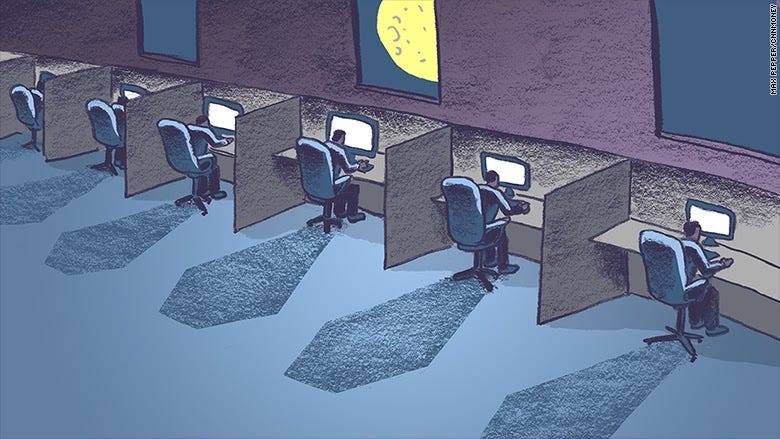How to Relight a Burnt Out Match: Overworking & Burning Out
Let’s start by pondering over this question: How much work is considered enough? There’s no definite answer — after all, everyone has their…

Let’s start by pondering over this question: How much work is considered enough? There’s no definite answer — after all, everyone has their own opinions on this. Some may say that the standard 9–5pm is sufficient. Others may only feel satisfied once they’ve worked all day and night non-stop. Because there’s no parameters defining the extent of enough in the working world, overworking has become far more likely than should be deemed normal.
Overworking has, for a long time, prevailed in the typical workplace. Dating back to the Industrial Revolution, when jobs moved from tilling on the farm to manufacturing goods, the tendency to work hard for prolonged periods of time was paradigmatic of the industrial factory. Workers would clock up to as many as 70 hours a week, though this number declined slightly with the introduction of technology and mechanisation in the production process. Yet, industrial capitalism has long since established that working longer hours, and in the process sacrificing time and sleep, is balanced out by the profits you reap in at the end of the day.
The Prevalence of Overworking in Our World Today
There’s many reasons why one would overwork. Some have no choice but to juggle several jobs with minimal rest in order to put food on the table and a roof over their heads. Others work overtime to ‘prove a point’ to their employers, most likely because corporations favour handing a promotion over to someone who always goes the extra mile. The rest of us, though, overwork ourselves for our own self-satisfaction, or have bought into the ‘hustle culture’, a belief that non-stop work is the only way to achieve success. According to this trend, we’re supposed to ‘be productive’ all day, and any break taken should leave you feeling guilty about resting.

Overworking is rather prevalent in our society. Take Kuala Lumpur for example. The city ranked as the 4th most overworked city in 2020, with employees averaging about 12 hours of work a day. The top 3 most overworked cities were Hong Kong, Singapore and Seoul, with Tokyo taking 5th in the ranking. It’s clear to see that working long hours is eminent in the typical Asian workplace.
In Malaysia, one of our most overworked sectors is the medical field. Even before the pandemic hit, doctors have always toiled tirelessly in hospitals, sometimes undertaking shifts lasting more than 24 hours. The on-call system also requires them to be available round the clock. Due to their exhaustion, the case of a post-call car accident is not unlikely. Of these accidents, around 55% of them occurred after medical staff members had completed their 25 or 26-hour long shifts. The pandemic has only served to exacerbate this issue of overworking due to the shortage of manpower in the hospitals.

As mentioned, working long hours is often praised upon in society today. In China, large companies implement the “996” working hour system, where employees work from 9am to 9pm for 6 days a week without overtime pay. This system, seen as the road to success for the technological industry, has been applauded by Jack Ma of Alibaba and Richard Liu of JD.com. In Japan, the extent of overworking is transparent to the naked eye. They even have a term to describe ‘death by overworking’ — karoshi (過労死). This culture stems from the 1950s, and even though there have been measures taken by the government to quell the incidence of overworking, statistics show that there is still much room for improvement. In 2016, as many as 191 people died from overexerting themselves at work.
“Winners take all, big fish eat small fish, fast fish eat slow fish … this type of fierce competition has caused countless workers to pay a huge physical and mental price.”
— Yang Guoqing, from the Centre of Modern Human Resources Assessment
To top it off, the COVID-19 pandemic has fuelled the overworking culture in our society. For employees, it has become difficult to separate their jobs from their lives, when their homes now double as their office. For students, it has become habitual to attend online classes back-to-back, eyes straining against the glare of the computer screen. Under the false assumption that students have nothing else to do but study, tests and assignment due dates become allocated on weekends at the expense of the student’s free time.
The Detrimental Effects of Overworking, and Burning Out

As much as it is praised upon, overworking for prolonged periods of time has been proven to cause deleterious effects to both the mind and the body. Studies have shown that overtiring yourself increases the risk of developing cardiovascular diseases and hypertension. According to the World Health Organisation, more than 745,000 people died from overworking due to heart diseases and stroke. Moreover, the accumulation of stress from overworking impairs sleep, one of many unhealthy habits that can develop from toiling beyond your limits.
It is also important to point out that overworking for a long period of time typically leads to burnouts. A burnout consists of three dimensions: exhaustion, depersonalisation, which involves distancing yourself psychologically from your work; and reduced efficacy, also known as personal accomplishment. Someone going through a burnout often experiences low self-esteem and a sense of apathy towards their work, like a candle dwindling away. When one becomes too stressed out about their job and constantly overworks, their work might gradually become meaningless to them — and that’s when the burnout begins.
Aside from overworking, burnouts can also be caused by several other factors, such as having little support from your superiors at work, low recognition for your efforts in the office, or simply feeling out of control of your life and work. The pandemic has also scraped away much of the general public’s job motivation, with 29% of survey respondents admitting that they were on the brink of burnout after 2020.
Personally, I’ve had my fair share of burning out, too. As a high school student cooped up within the confines of her bedroom last year, I subjected myself to the books. It was like clockwork: wake up, study, eat, shower, sleep, repeat. Looking back at it now, I suppose I was ridiculously motivated to make use of every shred of my time. Eventually, my hard work did pay off, with the product of my travail gleaming on my results certificate. Yet, over the end-of-year holidays, I continued bending over backwards and committing myself to study hard. That was around the time that the flame of the match began to falter. Gradually, working for long hours became increasingly redundant to me, and it left me in a push-and-pull of needing to do work but unwilling to do it. At some point along the way, perhaps I had worked myself beyond my boundaries without realising, and burnt myself out in the process.
Ways to Deal with Burnout

Knowing full well the harmful effects of overworking and burning out, what are some ways we can avoid burning completely out of fuel?
1. Share your thoughts and feelings with other people.
Sometimes, all we need is someone else to hear us out. A solution may not be immediately achievable from talking to others, but sharing your personal struggles with a close friend or family member may lift some of the weight off of your shoulders. After all, there is nothing wrong with confiding in someone who will be willing to listen to you.
2. Take some time to reflect on why you started.
When you’re overworked to the point of no return, sometimes it’s essential to start from the basics. Unearth the past, and consider why and how you started what you did. Find the motivators that propelled you forward in the beginning. By discovering these aspects, perhaps it will be easier to gather enough purpose to continue. A shift of mindset could be all that is needed to drive you towards your ambition once more.
3. Prioritise taking care of yourself.
Ignoring the warning signs that your body flashes at you could cause detrimental effects to your health. Whilst working hard is important, it’s also crucial to take care of your physical and mental wellbeing. Caring for yourself involves eating all your meals, staying hydrated, sleeping sufficiently, and exercising regularly. Additionally, some habitual practices such as meditation have been proven to relieve stress and help you tap into yourself.
The challenge of work-life balance is without question one of the most significant struggles faced by modern man
— Stephen Covey
These are just a few tips on how to deal with burning out. Although it may be tough to deviate from your usual work or study routine, following these steps could certainly benefit in the long run. As much as it is difficult to believe, especially in a capitalistic society in this contemporary era, life really isn’t all about work. To live a long, purposeful life, it’s fundamental to rest sufficiently, too — and the flame within us is sure to continue blazing.
[Written by: Siow Chien Wen]

